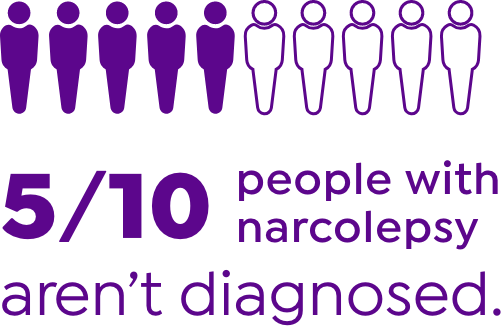
What is excessive daytime sleepiness (EDS) due to narcolepsy?
EDS is a medical condition that can leave you feeling sleepy all the time, and you may have a need to sleep during the day. This can lead to problems with work, school, activities, hobbies, and even your relationships.
Narcolepsy can affect your brain's ability to stay awake. Your brain's sleep and wake systems are similar to an on-and-off switch. When the wake system is turned on, the sleep system is turned off, and vice versa. In narcolepsy, the on/off switch is broken, causing sleep to intrude into wakefulness
EDS from narcolepsy can be unpredictable. You can suddenly fall asleep multiple times per day, and it can last from a few minutes to several hours. It’s common to feel this urge to sleep in quiet, relaxing situations, but it can also happen while performing mentally or physically demanding activities
Common signs and symptoms of EDS due to narcolepsy include:
Sleep attacks
Irresistible urge to sleep
Frequent sleepiness
Trouble staying awake and alert during the day
Unrefreshing sleep
Feeling tired regardless of how long you've slept
Brain fog
Difficulty keeping attention and focus during the day


Here’s how EDS due to narcolepsy is diagnosed
Your healthcare provider will conduct a sleep study to confirm a diagnosis of narcolepsy
To diagnose EDS, your discussion with your healthcare provider may include answering a quiz called the Epworth Sleepiness Scale (ESS). In this quiz, you’ll answer questions about your likelihood of falling asleep in everyday situations
Answer the Wake-Up Call Questionnaire
Five simple questions can help you start a conversation with your healthcare provider.
Start questionnaireDo not take SUNOSI if you are taking, or have stopped taking within the past 14 days, a medicine used to treat depression called a monoamine oxidase inhibitor (MAOI).
Before taking SUNOSI, tell your doctor about all of your medical conditions, including if you:
- have heart problems, high blood pressure, kidney problems, diabetes, or high cholesterol.
- have had a heart attack or a stroke.
- have a history of mental health problems (including psychosis and bipolar disorders), or of drug or alcohol abuse or addiction.
- are pregnant or planning to become pregnant. It is not known if SUNOSI will harm your unborn baby.
- are breastfeeding or plan to breastfeed. It is not known if SUNOSI passes into your breast milk. Talk to your doctor about the best way to feed your baby if you take SUNOSI.
- SUNOSI does not treat the underlying cause of O.S.A. and SUNOSI does not take the place of any device prescribed for O.S.A., such as a continuous positive airway pressure (CPAP) machine. It is important that you continue to use these treatments as prescribed by your healthcare provider.
Do not take SUNOSI if you are taking, or have stopped taking within the past 14 days, a medicine used to treat depression called a monoamine oxidase inhibitor (MAOI).
Before taking SUNOSI, tell your doctor about all of your medical conditions, including if you:- have heart problems, high blood pressure, kidney problems, diabetes, or high cholesterol.
- have had a heart attack or a stroke.
- have a history of mental health problems (including psychosis and bipolar disorders), or of drug or alcohol abuse or addiction.
- are pregnant or planning to become pregnant. It is not known if SUNOSI will harm your unborn baby.
- are breastfeeding or plan to breastfeed. SUNOSI passes into your breast milk. Talk to your doctor about the best way to feed your baby if you take SUNOSI.
The most common side effects of SUNOSI include:
- •headache
- •nausea
- •decreased appetite
- •anxiety
- •problems sleeping
SUN CON ISI 06/2023
Please see Medication Guide.
- SUNOSI does not treat the underlying cause of O.S.A. and SUNOSI does not take the place of any device prescribed for O.S.A., such as a continuous positive airway pressure (CPAP) machine. It is important that you continue to use these treatments as prescribed by your healthcare provider.
Do not take SUNOSI if you are taking, or have stopped taking within the past 14 days, a medicine used to treat depression called a monoamine oxidase inhibitor (MAOI).
Before taking SUNOSI, tell your doctor about all of your medical conditions, including if you:
- have heart problems, high blood pressure, kidney problems, diabetes, or high cholesterol.
- have had a heart attack or a stroke.
- have a history of mental health problems (including psychosis and bipolar disorders), or of drug or alcohol abuse or addiction.
- are pregnant or planning to become pregnant. It is not known if SUNOSI will harm your unborn baby.
- are breastfeeding or plan to breastfeed. It is not known if SUNOSI passes into your breast milk. Talk to your doctor about the best way to feed your baby if you take SUNOSI.





